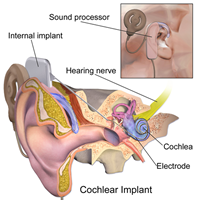What are computer based implants
Computer based implants are devices implanted inside the body that are controlled by or control computers. They are used in various fields of medicine as well as by people known as body hackers.
Cochlear implants
Cochlear implants have been able to partially restore hearing for some people with no or limited hearing. Cochlear implants bypass the damaged part of the ear and stimulate the hearing nerve directly, enhancing the clarity
of sounds.

Heart implants
The pacemaker has long been used for patients with defective hearts. They provide artificial stimulation to ensure the heart continues to beat at the correct pace.
Brain implants
Brain implants are electronic devices implanted into the brain. In 2023, a paralyzed man was able to walk again with the aid of a brain implant connected directly to nerves in his spine. Brain computer interface can allow
paralyzed people to control a computer with their brain.
Ethical concerns have been raised over the use of monkeys in research at the company Neuralink. The company admits some monkeys died but denies mistreatment. The complications surrounding the ethics of human testing mean
that Neuralink and other firms in the field are only just starting to receive approval for human trials. In 2024, Neuralink announced they had successfully implanted a chip into a human test subject. Although the initial plan
is to create this abilty for disabled people the firm has stated it's intention to develop products that would one day enabe everyone to communicate with a computer or machine at the speed of thought.
Biohackers
Biohacking, also called body hacking, is augmenting your body with digital additions. People have implanted:
- RFID chips that can be programmed to open doors, unlock phones, make
payments etc.
- A device to allow the wearer to sense where north is
- Headphones implanted directly into the ear
Ethical concerns
Most people are comfortable with implants to improve the lives of those with disabilities but as implants improve and become better than the human equivalent should people be able to get cyborg parts? If so, how would the
inequality of access to these likely very expensive parts affect society?
What about the military?
Would you buy a memory expansion pack for your brain?
What about something that speeds up your mental processing?